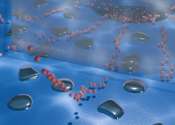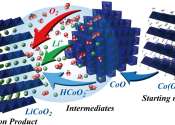Potassium (pronounced /pɵˈtæsiəm/) is the chemical element with the symbol K (Latin: kalium, from Arabic: القَلْيَه al-qalyah “plant ashes”, cf. Alkali from the same root), atomic number 19, and atomic mass 39.0983. Potassium was first isolated from potash. Elemental potassium is a soft silvery-white metallic alkali metal that oxidizes rapidly in air and is very reactive with water, generating sufficient heat to ignite the evolved hydrogen.
Potassium in nature occurs only as ionic salt. As such, it is found dissolved in seawater, and as part of many minerals. Potassium ion is necessary for the function of all living cells, and is thus present in all plant and animal tissues. It is found in especially high concentrations in plant cells, and in a mixed diet, it is most highly concentrated in fruits.
In many respects, potassium and sodium are chemically similar, although they have very different functions in organisms in general, and in animal cells in particular.









